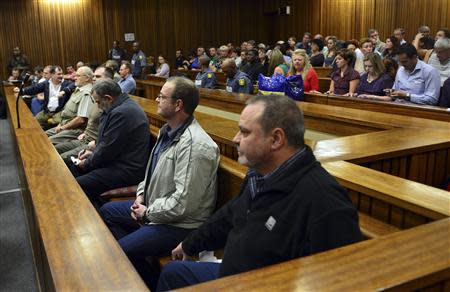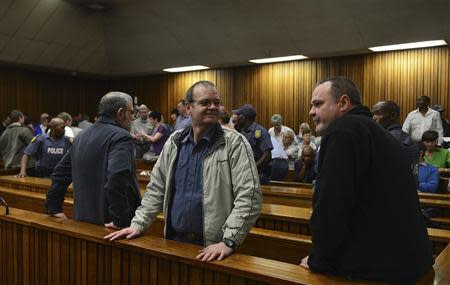Leaders of South African 'Boer Army' plot receive long jail terms
JOHANNESBURG (Reuters) - Five leaders of a "Boer Army" white supremacist plot in South Africa to assassinate Nelson Mandela and drive blacks out of the country were sentenced to 35 years in prison on Tuesday after a trial lasting more than 10 years. A Pretoria High Court handed down sentences ranging from 20 to five years to others of the 21 defendants of the "Boeremag", a rag-tag militia of apartheid loyalists accused of a botched 2002 coup attempt in Africa's biggest economy. This had including charges of causing explosions. Some of the sentences were suspended. Nine of the accused walked free after being held for 11 years behind bars during the trial, National Prosecuting Authority spokesman Medupi Simasiku told Reuters. In the course of the prolonged case, witnesses testified that the Boeremag planned to assassinate anti-apartheid hero Mandela, who was South Africa's first black president, by planting a bomb along a route he was due to travel. Their plans however were thwarted when the world-famous statesman, now retired, aged 95 and convalescing at home in Johannesburg, travelled to his engagement by helicopter. Several of the Boeremag members were charged with causing nine explosions at various sites in Gauteng, South Africa's richest province in October 2002, with most blasts taking place in the sprawling township of Soweto, south of Johannesburg, where one woman was killed. Racial tensions persist almost 20 years since the first democratic elections ended apartheid rule in South Africa. But groups like the Boeremag and the Afrikaner Resistance Movement of murdered far-right leader Eugene Terre'blanche have little backing from the country's almost 5 million whites. The alleged mastermind of the Boeremag, former university lecturer Mike du Toit, was the first to be convicted last year for high treason, and was among those given a 35-year sentence. According to prosecution testimony, the Boeremag's plot, concocted around barbeques and at fast food outlets, had suggested driving South Africa's black majority of about 40 million out of the country and into Zimbabwe by lining a major national road between the two countries with food parcels. It had also proposed sending the 1.2 million Indians in the country back to the subcontinent by boat. (Reporting by Peroshni Govender; Editing by Pascal Fletcher)


